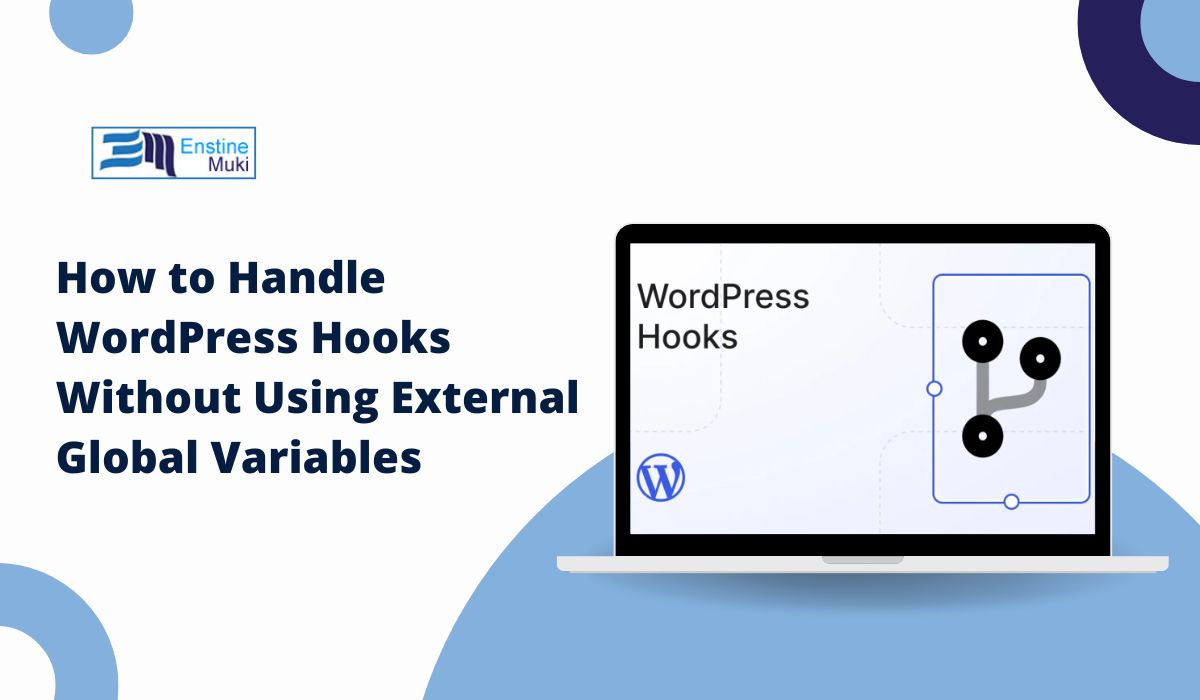WordPress hooks are a powerful feature that lets you modify functionality and add custom features to your site. However, when working with hooks, it’s often tempting to use global variables to access data across different functions. While global variables can sometimes be useful, relying on them excessively can create issues, such as data conflicts, security vulnerabilities, and difficulty in troubleshooting.
This article will explain why it’s generally a best practice to avoid using external global variables with WordPress hooks and offer alternative methods for passing data to hooks effectively.
Understanding Why Global Variables Are Problematic in WordPress
In programming, global variables are variables that are accessible from any part of your code. However, in a complex system like WordPress, global variables can introduce challenges:
- Unintended Conflicts: Since global variables are accessible everywhere, there’s a risk that another part of your code (or a plugin) may accidentally overwrite the variable, causing unexpected behavior.
- Difficulty in Debugging: It’s often harder to track the origin of global variables, especially in larger projects, making it challenging to debug issues.
- Reduced Code Reusability: Functions that rely on global variables become less modular and harder to reuse because they are dependent on the presence of specific external data.
- Potential Security Risks: Unrestricted global variables increase the risk of data leaks and unintended access, particularly when sensitive information is stored in a global scope.
By avoiding global variables, you create more robust, secure, and maintainable WordPress code. Let’s look at some best practices and alternative approaches to working with hooks without global variables.
Alternative Methods to Using Global Variables with Hooks
Instead of using global variables, you can use a few alternative techniques to pass data to your hook functions in WordPress.
1. Use Function Parameters with Hooks
One of the simplest ways to avoid global variables is to pass data through function parameters in your hooks. WordPress allows certain hooks to accept parameters, which you can use to transfer data.
Example: Passing Data with a Filter Hook
function custom_modify_content($content) {
$extra_text = “Thank you for visiting!”;
return $content . ” ” . $extra_text;
}
add_filter(‘the_content’, ‘custom_modify_content’);
In this example:
- The function
custom_modify_content()appends text to the post content using thethe_contentfilter. - By directly working with parameters (
$content), there’s no need for a global variable to access or modify the content.
2. Use Class Properties for Encapsulation
If your code involves multiple functions that need to share data, encapsulating them within a class can be an effective solution. Class properties serve as controlled data storage, making them accessible only within the class.
Example: Using Class Properties for Shared Data
class CustomContentModifier {
private $extra_text;public function __construct() {
$this->extra_text = “Thank you for reading!”;
add_filter(‘the_content’, [$this, ‘modify_content’]);
}public function modify_content($content) {
return $content . ” ” . $this->extra_text;
}
}new CustomContentModifier();
In this example:
- The
extra_textproperty is stored within theCustomContentModifierclass. modify_content()is a method that uses$this->extra_text, avoiding the need for a global variable.- Since the data is encapsulated within the class, it’s isolated and protected from other parts of the code.
3. Use WordPress Options for Persistent Data
For data that needs to be accessible across multiple functions and pages, consider using WordPress options. Options are stored in the WordPress database and are especially helpful for persistent data.
Example: Using WordPress Options for Persistent Data
// Setting an option
update_option(‘custom_message’, ‘Thank you for visiting!’);// Accessing the option in a hook
function custom_display_message($content) {
$message = get_option(‘custom_message’);
return $content . ” ” . $message;
}
add_filter(‘the_content’, ‘custom_display_message’);
Here:
- The
update_option()function stores thecustom_messagedata. - The
get_option()function retrieves this data within thecustom_display_messagefunction, keeping data management centralized and avoiding global variables.
4. Use the $wp_filter Global Variable with Caution
In cases where you need to check if a hook is already being applied or to modify the behavior of hooks directly, $wp_filter (a WordPress global variable that holds all registered hooks) can be used carefully to access hook data without modifying the global scope.
Example: Checking if a Hook is Active
if (has_filter(‘the_content’, ‘custom_display_message’)) {
// Logic when the hook is active
}
Using functions like has_filter() or remove_filter() allows you to interact with hooks without needing to define extra global variables. However, this approach should be used sparingly to avoid complexity.
voiding Globals with Custom Data Storage Classes
For advanced cases, creating a custom data storage class can help manage complex data structures without relying on global variables. A dedicated storage class acts as a container for your data, providing getter and setter methods to access and update information.
Example: Custom Data Storage Class
This setup:
- Uses a static
DataStorageclass to store and retrieve data. - Provides a flexible solution for managing data without relying on traditional global variables.
Conclusion: Write Cleaner Code Without Global Variables
While global variables might seem convenient, they can lead to issues in WordPress, especially when dealing with hooks. By using parameters, classes, WordPress options, and custom storage classes, you can manage data effectively without global variables. This approach makes your code more modular, secure, and easier to maintain.
Have other methods to manage WordPress data? Share your tips in the comments, and let’s build better, cleaner WordPress sites together!
